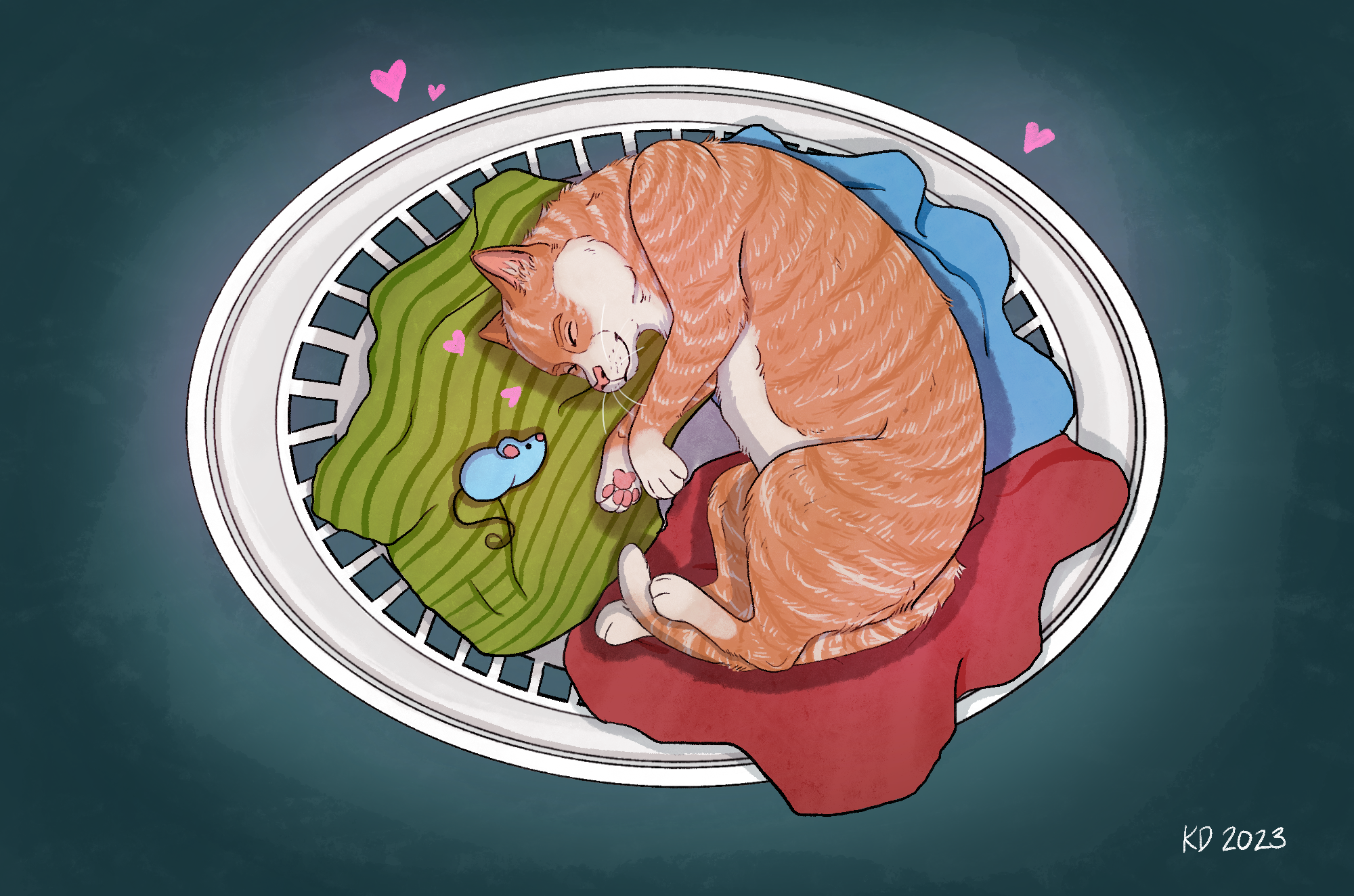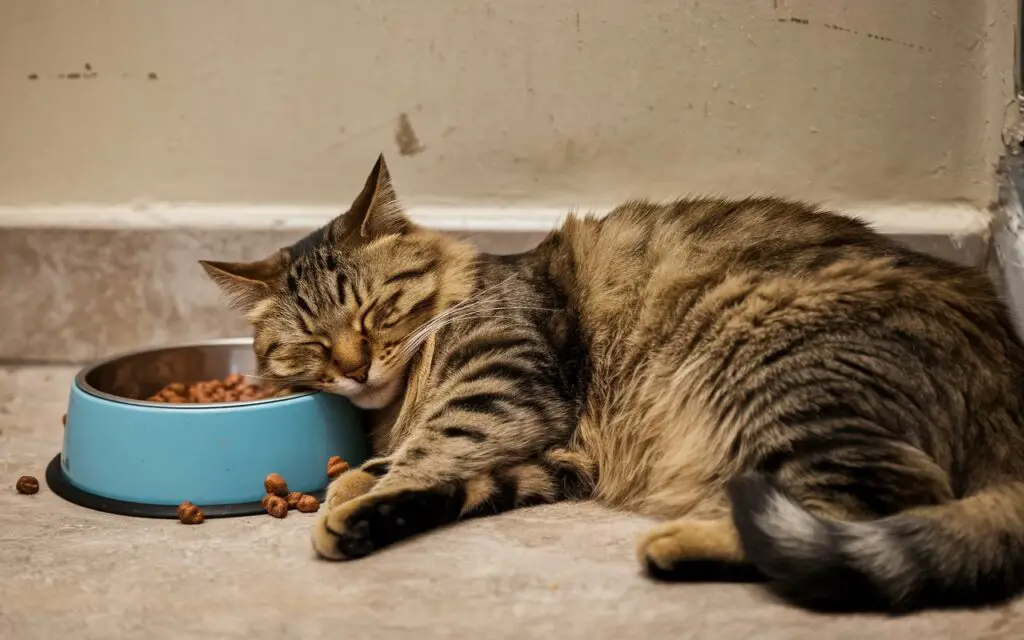Physical Address
304 North Cardinal St.
Dorchester Center, MA 02124
Physical Address
304 North Cardinal St.
Dorchester Center, MA 02124

Your cat is sleeping next to food for comfort or security reasons. It could also indicate territorial behavior.
Cats are creatures of habit and their behavior often tells us a lot about their needs and feelings. If you have noticed your cat snoozing by its food dish, you may have wondered about the reasons behind this preference. It is not uncommon for cats to seek a sense of security, especially in their eating environment, by resting where they eat.
Alternatively, sleeping next to the food bowl might be your cat’s way of claiming territory and keeping a close eye on their food supply. Understanding these behaviors can enhance the bond between you and your feline friend, ensuring they feel safe and content within your home.

Cats often seek the coziest spots in the house. They may choose places that provide both comfort and a feeling of safety. The food bowl area is no different. It can be a space where they feel most content and protected. Here, we explore why your whiskered friend may prefer to nap near their food source.
Cats are creatures of habit, often looking for stable and secure locations for rest. Sleeping next to the food bowl might signal their desire to guard their sustenance. Here are some reasons why your cat finds security by their food dish:
A cat’s behavior is deeply rooted in their instincts. Sleeping beside the food bowl can be an ancestral trait, reminiscent of their wild relatives. Wild cats often keep watch over their prey, and domestic cats might mimic this. Let’s look at some instinctual actions:
| Instinctual Behavior | Explanation |
|---|---|
| Staking Territory | The food area is important. Cats want to claim it as theirs. |
| Vigilance | By sleeping there, they remain alert to any potential threats. |
| Mimicking the Wild | They emulate their ancestors who guarded their prey. |
Eating Habits of Cats
Cats are fascinating creatures with unique behaviors, particularly when it comes to their eating habits. One curious behavior some cat owners notice is their furry companion sleeping next to the food bowl. To unravel the mystery behind this behavior, it is crucial to understand the eating habits of cats.
Cats are known for their love of routine when it comes to meal times. Unlike dogs, cats prefer to nibble throughout the day. This is called free-feeding and can play a part in why they might sleep next to their food. Cats have internal clocks that align with their eating schedules. They might position themselves near their food to ensure they don’t miss their favorite time to eat.
In the wild, cats are solitary hunters and highly territorial, especially concerning food. Even in a home setting, these instincts can influence their behavior. If your cat snoozes by their bowl, it could be a sign of resource guarding. They might be securing their meal from other pets or ensuring they have first dibs when hunger strikes. This behavior is natural and signifies their instinct to protect what’s valuable to them.
Cats often sleep next to their food bowls due to stress and environmental changes. These factors disrupt their routine and sense of security, causing unusual behaviors. Understanding the underlying causes can help ensure your feline friend feels comfortable and safe.
Cats display anxiety in various ways. Here are some common signs:
When cats face new environments or changes at home, they need time to adapt. Here’s how to help:

Credit: www.nytimes.com
Your cat’s sleeping habits can say a lot about their health. Noticing your furry friend curled up next to their food bowl might seem odd. Cats usually separate their sleeping quarters from their eating area. They are, after all, creatures of habit. A sudden change in their sleeping location could be a sign of an underlying issue. It’s essential to be observant of such changes.
One possible explanation could be illness-related lethargy. Like humans, cats may not move much when they don’t feel well. Being close to their food bowl means less effort needed to eat. This could be their way of conserving energy.
Stay vigilant for other unusual behaviors or symptoms:
| Symptom | Possible Concern |
|---|---|
| Vomiting | Digestive issue |
| Diarrhea | Internal distress |
| Limping | Physical injury |
| Hiding or isolation | Anxiety or sickness |
A change in sleep patterns paired with any of these signs warrants a visit to the vet. Early detection is key in handling potential health issues.
Enhancing Your Cat’s Living Space can explain why your whiskered friend chooses to nap by the food dish. Cats cherish comfort, safety, and routine. By improving their environment, we can better understand and cater to their quirky habits. Let’s explore how simple changes can make a feline’s space more welcoming, influencing where they choose to snooze.
A cozy corner can entice your cat away from the food bowl. Cats love warm, enclosed spaces. Think about these elements:
Provide a special bed or blanket near their favorite spot. This may be a shelf or a piece of furniture. Cats enjoy high places. A cat tree with a sleeping perch can also be inviting.
Routines create security for cats. Components of a stable routine include:
Stick to a schedule to help your cat understand the day’s flow. Cats feel in control when they know what to expect. They are less likely to sleep near the food bowl if they trust that meals will come on time. Toys and activities should be part of each day. A stimulated cat is a happy cat.

Credit: damndelicious.net
Yes, it’s normal for cats to sleep by their food bowl. It’s often a sign of comfort and security, indicating they feel safe in their feeding area.
Sleeping by the food bowl isn’t typically a health concern. It can reflect a cat’s instinct to guard their food or their satisfaction after eating.
This behavior alone doesn’t signify behavioral issues. It’s a natural instinct for cats to stay close to their food source, but observe for changes in behavior or appetite.
Encourage your cat to sleep in its bed by placing it in a quiet, comfortable area. You can also add familiar scents or use pheromone sprays to make it more appealing.
Understanding your cat’s behavior can be intriguing, especially when it involves napping by the food bowl. This cozy habit may signal comfort, safety, or even a health-related issue. Observing and consulting a vet can assure your feline friend’s well-being. Remember, your pet’s quirky actions often have simple explanations, enriching the bond you share.
Keep watching for peaceful purrs and contented snoozes!